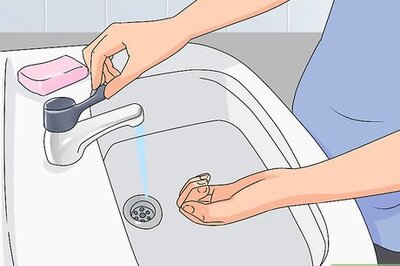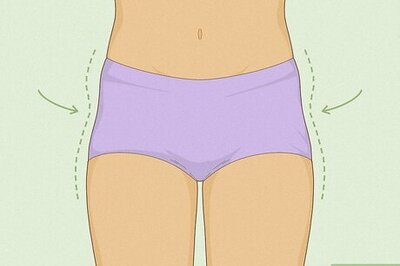
views
Paris: A French novelist will file a criminal complaint on Tuesday accusing Dominique Strauss-Kahn of attempted rape, her lawyer said, throwing fresh uncertainty into a fierce national debate about whether the former International Monetary Fund chief can return to his country's presidential race.
A sexual assault case against Strauss-Kahn in New York has been badly weakened by questions about his accuser's credibility. As a result, France was consumed Monday by the question of whether the longtime Socialist Party politician would revive his dream of running against unpopular conservative President Nicolas Sarkozy.
The political world was hit by a new shock when the lawyer for writer Tristane Banon announced she planned to file the complaint in Paris within a day.
Banon came forward after Strauss-Kahn's May 14 arrest in New York to accuse him of wrenching open her bra and trying to unbutton her jeans in 2002. Lawyer David Koubbi said Banon had been dissuaded at the time from filing charges by her mother, a regional councilor in Strauss-Kahn's Socialist party.
Koubbi also had said his client had no intention of pressing charges while the American prosecution was going on because the two cases should be kept separate. Now, Banon is pressing forward, Koubbi told The Associated Press.
Messages of support for the complaint quickly appeared on Banon's Facebook page.
Before Koubbi's announcement, the country was split on whether it wanted Strauss-Kahn back in public life: two polls showed an almost even division between those who thought he should return, and those who believed his political career was over.
The former IMF chief's re-entry to politics would be a tectonic shift in a campaign already shaken by his arrest on charges of attacking a New York hotel maid. The Socialist had been widely seen as the leading contender in the 2012 election, leading polls in the months before his arrest.
With the alleged victim's credibility undercut and Strauss-Kahn free on bail, French politicians and pundits appear to almost uniformly assume that the charges against him will be dropped in coming weeks.
For many, the question is now whether a man paraded in handcuffs before photographers outside a Harlem police station a month and a half ago will try to run against widely unpopular conservative president Nicolas Sarkozy and become leader of the world's fifth-largest economy.
"DSK Back?" the left-leaning daily Liberation asked on its front page Monday, describing Strauss-Kahn's release from house arrest as having turned the Socialist primary race upside down for the second time in as many months.
"Dominique Strauss-Kahn will express his intentions when he wants to," Socialist Party leader Martine Aubry told France-2 television.
The charges still stand against Strauss-Kahn, who has relinquished his passport to authorities in New York. Another court hearing would be needed for him to get it back. His next appearance is scheduled for July 18, five days after the deadline for candidates to register in the Socialist Party primary.
As a result, much of the debate about Strauss-Kahn's political future centers on whether the Socialists would push back the primary deadline.
"Let's acknowledge that if Strauss-Kahn decides to come back as a candidate on our side, no one will try to oppose him using some calendar," said Aubry, who declared her candidacy only after Strauss-Kahn's arrest.
The Socialist Party's spokesman appeared to disagree, an indication of the confusion and disagreement within the party about betting the opposition's chances of defeating Sarkozy on a man seen by some as a martyr of American injustice and by others as an out-of-touch jet-setter with a history of crude behavior toward women.
"We can't base the (political) calendar, which involves millions of French people, on the American judicial calendar," party spokesman Benoit Hamon said Monday.
Hamon left open the possibility, however, that Strauss-Kahn could become a candidate even after the official deadline, an act that would presumably require an extraordinary effort by Strauss-Kahn to get his divided party to bend its own rules.
"If ever Dominique Strauss-Kahn, beyond July 13th, says that he would like to enroll in this calendar, which doesn't seem the most likely, we are reasonable people, we will discuss with him under what conditions he could do so," Hamon said.
A poll released Monday found that 51 percent of French people found that Strauss-Kahn no longer had a political future, versus 42 percent who thought he did.
The telephone poll of 956 adults selected as a demographically representative sample was conducted July 1 and 2 by the Ipsos Public Affairs institute for the magazine Le Point. No margin of error was provided.
Another poll out Sunday conducted by Harris Interactive poll for the newspaper Le Parisien showed 49 percent of those surveyed saying 'yes' to the question "Without prejudging his innocence or guilt, do you want DSK to come back to the French political scene one day?"
At least some were won over by what they perceived as his mistreatment in the U.S.
"I had no intention of supporting him in the first round, but if he returns to French political life I will certainly vote for him," Jean-Rene Gendre, 63, said as he went shopping in central Paris. "What happened to him I think was a terrible manipulation."
Forty-five percent of respondents to the Harris poll said they didn't want Strauss-Kahn back in politics and six percent didn't answer the question. The agency asked a demographically representative group of 1,000 people 18 years old and older to fill out the July 1-2 online survey. No margin of error was provided.
Sarkozy's conservative allies have maintained virtually complete silence on Strauss-Kahn's arrest. But on Monday, some appeared to be returning to the normal tenor of a political campaign.
Sarkozy has been assailed from the left for what some call his bling-bling image and tax policies that critics say favor the rich, in a country proud of its social welfare system and revolutionary past.
Strauss-Kahn had come under some criticism before his arrest for appearing in a friend's Porsche and for reports he wore highly expensive tailored suits.
After his arrest, he lived under house arrest in a $50,000 (euro34,500)-a-month town house in Manhattan's trendy TriBeCa neighborhood.
"Between his luxury tastes and other subjects, Dominique Strauss-Kahn has not offered a very positive image recently," Sports Minister Chantal Jouanno, a Sarkozy ally, said on Europe-1 radio.
















Comments
0 comment